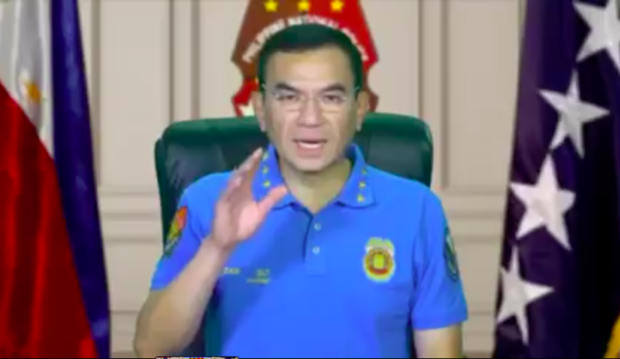PNP assures PH: We also want to know whether there were abuses in drug war

(FILE) PNP chief Gen. Guillermo Eleazar. Screengrab from Facebook / PNP livestream
MANILA, Philippines — The Philippine National Police (PNP) has assured Filipinos that police officials themselves want to ascertain whether human-rights abuses really happened in the conduct of the war against illegal drugs, as they want to steer away from sweeping generalizations.
PNP chief Gen. Guillermo Eleazar said on Wednesday — a day after the Commission on Human Rights (CHR) released some details about their own drug war probe — that generalizing the drug war being riddled with extrajudicial killings (EJKs) is unfair to officers who sacrificed their lives for the campaign.
“We in the Philippine National Police would also want to know the truth because these allegations of human rights and extra-judicial killings that have been hounding us in more than five years have resulted in the sweeping generalization that all our operations against illegal drugs are tainted with abuses,” Eleazar said in a statement.
“This is unfair to a number of our operatives who died and were wounded in the conduct of operations and this grossly ignores the fact that the efforts and sacrifices of our men on the ground have resulted in the unprecedented reduction of index crimes across the country,” he added.
CHR on Tuesday raised new concerns about the government’s anti-drug program, as eyewitnesses’ testimonies supposedly raise questions on whether some of the operations were really conducted, and if suspects were not subdued before being killed.
Article continues after this advertisementAccording to CHR Commissioner Gwendolyn Pimentel-Gana, the agency’s investigation into the 579 drug-related incidents in Metro Manila, Central Luzon, and Calabarzon showed discrepancies in police reports and eyewitness accounts of the operations.
Article continues after this advertisementThis includes the supposed inability of some drug war suspects to even launch a firefight against the police officers, and that some of those killed were not the targets of operations — similar to what happened in the case involving slain teenager Kian delos Santos.
“There are also other patterns of discrepancies based on eyewitness accounts during drug operations by law enforcers, including that the alleged operations might have not actually been conducted; that alleged ‘nanlaban’ victims could not have initiated a shootout; that some victims were said to be already under police custody when they were killed,” Pimentel-Gana said on Tuesday.
“[…] that allegedly unjustified violence was prevalent in the conduct of said operations; that planting of evidence was observed by witnesses in some incidents; and that some victims killed might not have been the intended target of the operations,” she added.
READ: CHR’s drug war probe: Some ops probably fake, suspects already subdued when killed
CHR also stressed that of the 870 victims from the 579 cases they looked into, 71 are women and 24 were minors. At least 451 incidents in the 579 cases were attributed to police officers, 104 were done by unidentified individuals, and 24 cases have no significant data about them.
Most of the cases jive along with the police’s claim that drug suspects initiated the firefight, or what is commonly known as ‘nanlaban’. However, CHR found out that only 11 individuals — a measly two percent — survived the killings.
Eleazar said that they respect CHR’s own probe as it is part of their constitutional mandate. However, he also assured the commission and the public that the investigation being done by PNP and the Department of Justice has the same goal — to identify possible abuses in the drug war.
“We respect the investigation conducted by the Commission on Human Rights as this task falls under its constitutional mandate,” he said. “But the main reason behind the investigation conducted by the CHR is the same reason why we coordinated with the Department of Justice for the review of the police operations relating to the campaign against illegal drugs.”
“The Philippine National Police remains focused on its commitment to transparency and accountability on this matter and this is the reason why we are now working with the National Bureau of Investigation and will continuously coordinate with the DOJ for review of more of these cases,” he stressed.
The drug war has been a major criticism of President Rodrigo Duterte’s administration, drawing local and international condemnation for allegedly disregarding human rights in the operations.
As of now, police officers have been held accountable in only one drug war-related death — that of Delos Santos, after a Caloocan court deemed three officers guilty as closed-circuit television camera footage showed them dragging the minor to a dark alley before he was shot.
The court also admitted that Delos Santos was not the police’s original target.
READ: Kian’s case: Litmus test for Duterte drug war
READ: 3 policemen guilty of killing Kian delos Santos — court
Currently, Duterte and other police officers are facing crimes against humanity complaint before the International Criminal Court (ICC) for their role in the drug war.
READ: ICC pre-trial chamber authorizes start of probe into Duterte’s drug war